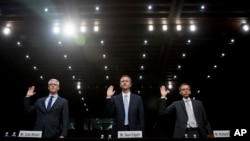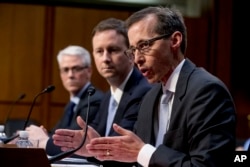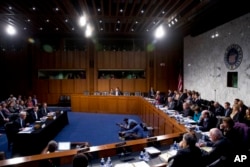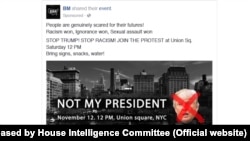Lawyers for internet giants Facebook, Google and Twitter met with three congressional committees this week to answer questions about Russian efforts to use the platforms to spread disinformation in the 2016 presidential election, and what they are doing to stop it from happening again.
Lawmakers were clear in their position that Russian use of the platforms was unacceptable, and several even called it an act of war.
"Cyber is an attack against our country. When you use cyber in an affirmative way to compromise our democratic, free election system, that's an attack against America," Senator Ben Cardin said Wednesday. "It's an act of war. It is an act of war."
That Russia attempted to interfere in the 2016 presidential election — an allegation the country adamantly denies — has been the stated position of the U.S. intelligence community since last year.
The lawyers said the exact scope of the alleged Russian operation remains unknown, though, even as they released more details about what Russian operatives were posting online.
Sean Edgett, Twitter's acting general counsel, told lawmakers the company studied all tweets posted from Sept. 1 to Nov. 15, 2016, and found that election-related content posted by accounts linked to Russia "was comparatively small."
Edgett described the criteria used to identify "Russian-linked account[s]" as "expansive," including any account that was created in Russia, any account linked to a Russian email address, or any account that "frequently tweets in Russian," among other qualifications.
Using these extremely broad qualifications, Edgett said Twitter was able to identify around 36,000 automated "bot" accounts that could be linked to Russia.
Those Russian-linked accounts, according to Edgett, represented 0.012 percent of total Twitter accounts during the time period, and the 1.4 million election-related tweets emanating from those accounts represented less than 0.74 percent of all election-related tweets.
"Those 1.4 million tweets received only one-third of a percent [0.33 percent] of impressions on election-related tweets," Edgett told lawmakers.
An "impression" is a metric used by social media companies to note how many times a specific post is served up to a user. An "impression" does not require any additional engagement by the user and doesn't even guarantee a user actually read the post, Edgett said.
In addition to the bot accounts, Twitter identified around 2,700 accounts linked to the Internet Research Agency (IRA), which has been described as a Russian troll farm.
"Of the roughly 131,000 tweets posted by those accounts during the relevant time period, approximately 9 percent were election-related, and many of their tweets — over 47 percent — were automated," he said.
Edgett called the number of Russian-linked accounts "small in comparison to the total number of accounts" on Twitter and said tweets from those accounts "generated significantly fewer impressions as compared to a typical election-related tweet."
Last week, the company said it would take the $1.9 million that Russian-backed media outlets spent on Twitter advertising since 2011, and spend it on external research into using Twitter in civic engagement, including efforts to root out malicious accounts and misinformation.
The Russian meddling campaign on Facebook was comprised of approximately $100,000 spent by "fake accounts associated with the IRA" on 3,000 ads between June 2015 and August 2017, according to Facebook lawyer Colin Stretch.
The ads, Stretch said, promoted around 120 Facebook pages set up by Russian actors and meant to focus on divisive social messages about racial issues, immigration and gun rights, among others.
In total, the Russian-linked Facebook pages produced around 80,000 pieces of content during the two-year time period. Stretch said approximately 150 million people may have been served up the IRA-created content, but it is impossible to know how many people actually saw the posts.
He said the content equaled about 0.004 percent of content of Facebook during the time and represented approximately 1 out of every 23,000 pieces of content on the platform.
"Though the volume of these posts was a tiny fraction of the overall content on Facebook, any amount is too much," Stretch said, noting the social media company removed the accounts and pages linked to the IRA.
According to Stretch, more than half of all impressions of IRA-funded posts came after the election and 25 percent of the ads were never shown to anyone.
"For 50 percent of the ads, less than $3 was spent. For 99 percent of the ads, less than $1,000 was spent," he said.
Facebook has turned over all the Russian ads to Congress and says its review of the activity is ongoing.
Google lawyer Richard Salgado said the company reviewed all political ads from June 2015 through last year's election, looking for "even the loosest connection to Russia, such as a Russian IP address or billing address, or use of Russian currency."
The company found that two accounts it believes are "associated with known or suspected government-backed entities" spent about $4,700 on ads related to the 2016 presidential election.
Salgado said the alleged Russian meddling also included use of YouTube, where the company found 18 channels with around 1,100 videos that were uploaded by individuals Google believes were associated with the Russian effort.
"These videos mostly had low view counts — just 3 percent had more than 5,000 views, and constituted only 43 hours of YouTube content," he told lawmakers. He added that people watch "over a billion hours of YouTube content a day, and 400 hours of content are uploaded every minute."
He called the Russian-linked videos "a relatively small amount of content," but said "any misuse of our platforms for this purpose is a serious challenge to the integrity of our democracy."
IN PHOTOS: A Look at Russian Social Media Election ‘Meddling’








